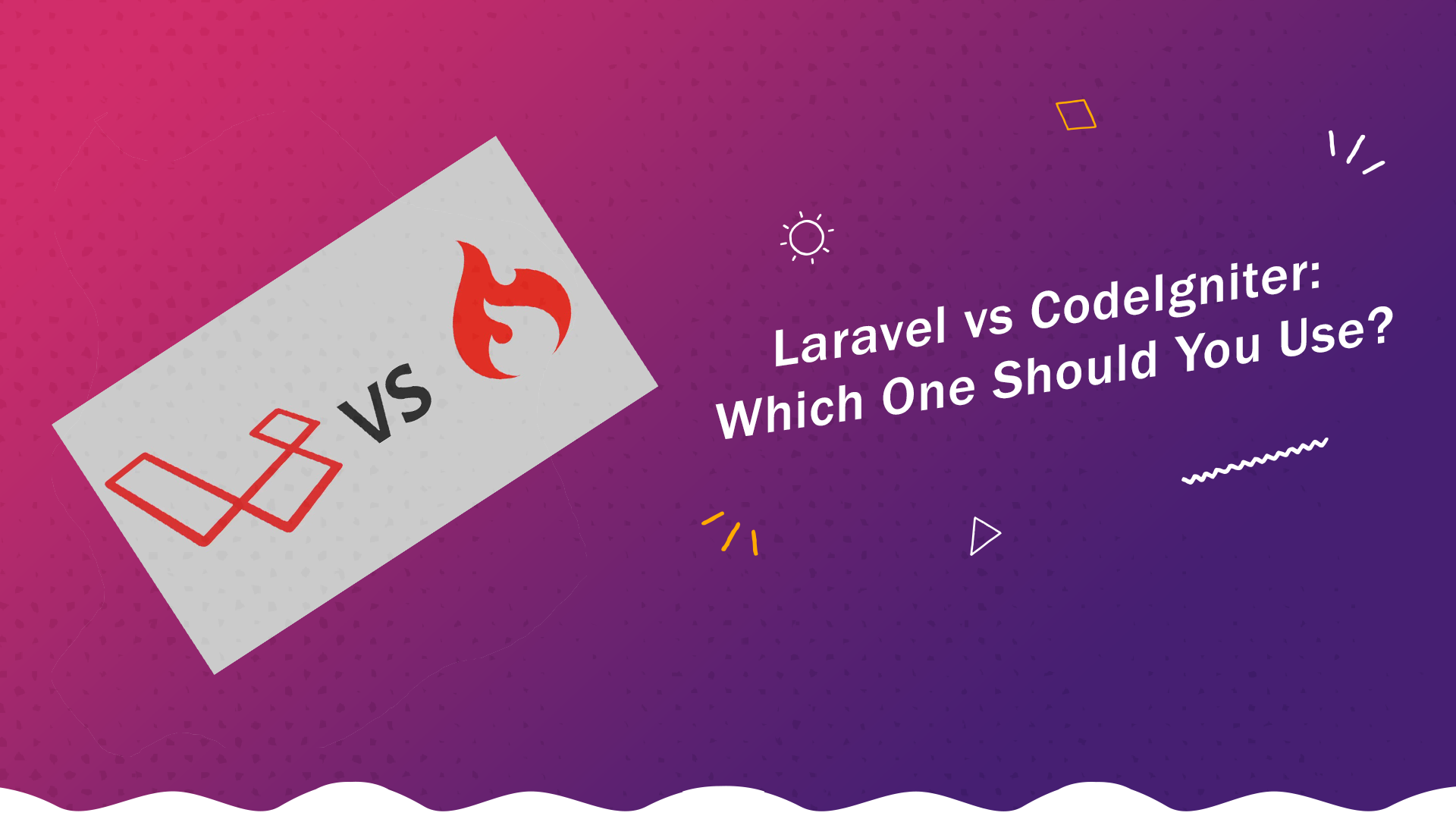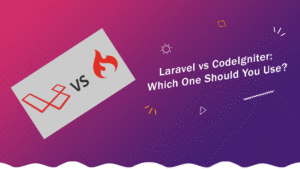Table of Contents
Laravel vs CodeIgniter: Choosing the Right PHP Framework for Your Project
When diving into the world of PHP Web Development, you’ll quickly encounter the dilemma: Laravel vs CodeIgniter: Which One Should You Use? Both are powerful PHP frameworks, offering distinct approaches to building robust and scalable web applications. Selecting the right one depends heavily on your project requirements, experience level, and long-term goals. This comprehensive guide will explore the key differences, strengths, and weaknesses of each framework to help you make an informed decision.
What is Laravel?
Laravel is a modern, full-stack PHP framework known for its elegant syntax, extensive feature set, and vibrant community. It emphasizes developer productivity by providing tools and conventions for common web development tasks, such as routing, templating, database interaction (ORM), and authentication. Its architecture promotes clean, maintainable code, making it a favorite among developers building complex applications.
What is CodeIgniter?
CodeIgniter, on the other hand, is a lightweight PHP framework designed for speed and simplicity. It offers a minimal footprint and requires less configuration compared to Laravel. This makes it a popular choice for smaller projects or teams who prioritize rapid development and a lower learning curve. While it doesn’t offer as many built-in features as Laravel, CodeIgniter excels at providing a solid foundation upon which developers can build custom solutions.
Key Differences Between Laravel and CodeIgniter
To truly understand which framework is right for you, let’s delve into the crucial differences between Laravel and CodeIgniter:
- Architecture: Laravel follows the Model-View-Controller (MVC) architectural pattern strictly, enforcing separation of concerns and promoting code organization. CodeIgniter, while MVC-based, is more flexible and allows for deviations from the standard structure.
- Features: Laravel comes packed with features out-of-the-box, including an ORM (Eloquent), templating engine (Blade), authentication scaffolding, and task scheduling. CodeIgniter offers a more minimalist core, requiring developers to rely on libraries or build their own solutions for many common tasks.
- Learning Curve: CodeIgniter generally has a steeper learning curve than Laravel, because you might need to code things yourself, while Laravel has great documentations and a huge community. For those How to Get Started with PHP for Beginners: A Comprehensive Guide, CI would be a good starting point.
- Community Support: Laravel boasts a larger and more active community than CodeIgniter. This translates to a wealth of online resources, tutorials, and pre-built packages (through Composer). CodeIgniter’s community is still active but smaller, resulting in fewer readily available solutions.
- Security: Both frameworks offer robust security features. Laravel includes built-in protection against common web vulnerabilities like cross-site scripting (XSS) and SQL injection. CodeIgniter also provides tools and guidelines for secure coding practices, but developers need to be more proactive in implementing security measures. Remember to watch out for the 10 Common Mistakes PHP Developers Make (and How to Avoid Them) when coding with either framework.
- Database Interaction: Laravel’s Eloquent ORM simplifies database interactions, allowing developers to work with data in an object-oriented manner. CodeIgniter offers a simpler database library that requires writing more manual SQL queries.
- Templating: Laravel uses the Blade templating engine, which offers features like template inheritance, sections, and control structures. CodeIgniter uses a simpler templating system that relies primarily on PHP code within views.
When to Choose Laravel
Consider Laravel if:
- You are building a large, complex web application with advanced features.
- You need a robust and scalable framework with a strong emphasis on code organization and maintainability.
- You want to leverage a wide range of pre-built features and packages.
- You value a large and active community with ample support and resources.
- You are familiar with or willing to learn the MVC architectural pattern and object-oriented programming principles.
When to Choose CodeIgniter
Consider CodeIgniter if:
- You are working on a smaller project with simpler requirements.
- You need a lightweight and fast framework that doesn’t require extensive configuration.
- You prioritize rapid development and a lower learning curve.
- You prefer a more flexible framework that allows for greater control over the application’s structure.
- You have limited experience with PHP frameworks and want to start with something easier to grasp.
Laravel vs CodeIgniter: A Side-by-Side Comparison Table
| Feature | Laravel | CodeIgniter |
|---|---|---|
| Architecture | Strict MVC | Flexible MVC |
| Features | Extensive | Minimalist |
| Learning Curve | Moderate | Easier |
| Community Support | Large and Active | Smaller |
| Database Interaction | Eloquent ORM | Database Library |
| Templating Engine | Blade | PHP-based |
The Importance of Strong PHP Fundamentals
Regardless of whether you choose Laravel or CodeIgniter, a solid understanding of PHP fundamentals is crucial for success. Frameworks build upon the core concepts of the PHP language, and mastering these fundamentals will enable you to write cleaner, more efficient code. Consider investing time in learning about topics like data types, control structures, functions, and object-oriented programming in PHP. PHP can be a lot of fun if you understand it.
Leveraging PHP Functions
One of the key aspects of mastering PHP is understanding and utilizing its built-in functions, as well as creating your own custom functions. These Mastering PHP Functions: A Complete Guide to Writing Efficient Code are reusable blocks of code that perform specific tasks, saving you time and effort. Whether you choose Laravel or CodeIgniter, a strong grasp of PHP functions will significantly enhance your development skills.
The Future of PHP Frameworks
The landscape of PHP frameworks is constantly evolving. New frameworks and libraries are emerging, and existing frameworks are being updated to incorporate the latest features and best practices. Staying up-to-date with the latest trends and technologies is essential for PHP developers. Consider exploring other PHP frameworks like Symfony, Laminas (formerly Zend Framework), and CakePHP to broaden your knowledge and skillset. Remember to use PHP and Web Development to find out how others are learning to cope with this.
Conclusion: Which One Should You Use? Laravel vs CodeIgniter
Ultimately, the decision of Laravel vs CodeIgniter: Which One Should You Use? depends on your specific needs and preferences. Laravel offers a more comprehensive and feature-rich solution for complex applications, while CodeIgniter provides a lightweight and flexible option for simpler projects. Evaluate your project requirements, consider your experience level, and weigh the pros and cons of each framework before making a decision. Remember that both Laravel and CodeIgniter are powerful tools that can help you build amazing web applications. PHP.net is a valuable resource for anyone working with PHP frameworks. Additionally, explore framework comparison resources like StackShare to see how developers compare these frameworks in real-world projects. The best framework is the one that allows you to build the application you need efficiently and effectively.
Example Code Snippets (For Demonstration)
// Laravel Route
Route::get('/users', 'UserController@index');
// CodeIgniter Route
$route['users'] = 'user/index';
// Laravel Eloquent Model (Example)
namespace AppModels;
use IlluminateDatabaseEloquentModel;
class User extends Model
{
// ...
}
// CodeIgniter Model (Example)
class User_model extends CI_Model {
public function get_users() {
$query = $this->db->get('users');
return $query->result();
}
}
Throughout this article, the term ‘Laravel vs CodeIgniter: Which One Should You Use?’ has been used to provide a comprehensive overview of the comparison. This ensures that readers searching for this specific information can easily find and understand the key differences and benefits of each framework. Hopefully this discussion helps you determine the best tool for your needs.





